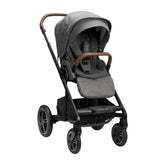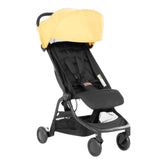How to Spot the Symptoms of Postpartum Depression & Get Help

Depression is a common problem following pregnancy. According to the U.S. Department of Health and Human Services, one in nine new mothers experiences postpartum depression (PPD). Yet despite its prevalence, there continues to be a pervasive stigma around PPD, making many parents feel embarrassed to talk about what they’re going through and preventing them from getting treatment that could help them feel better. A clearer understanding of what postpartum depression is and feels like can help you recognize whether you may have it. Becoming familiar with the signs you have postpartum depression can help you take that first courageous step toward getting help.
Signs and Symptoms of Postpartum Depression
People with postpartum depression have such intense feelings of sadness, anxiety, or despair that it often prevents them from being able to do their daily tasks. Postpartum depression can occur up to a year after having a baby, but it most commonly starts around one to three weeks after giving birth.
Baby Blues vs. Postpartum Depression
Most women feel depressed, anxious, and upset to some degree in the days immediately following childbirth (often referred to as postpartum blues or, more commonly, baby blues). They may feel angry with the new baby, their partners, or their other children. They also may:
- cry for no clear reason
- experience insomnia, loss of appetite, or have difficulty making decisions
- wonder whether they are capable of caring for an infant
While many of the symptoms of baby blues are similar to symptoms of postpartum depression, it’s essential to understand what differentiates the two. The baby blues usually subside about three to five days after they start. The symptoms of postpartum depression last longer and are more intense. Postpartum depression typically begins within the first month after childbirth, but it can begin during pregnancy or for up to a year after birth. Postpartum depression must be treated by a healthcare provider.
Physical Symptoms
Postpartum depression isn’t only about your emotions. Sometimes the first signs you will have postpartum depression are biological. If you have any of the following physical symptoms of depression for more than two weeks, you should contact your healthcare provider:
- Overeating or loss of appetite
- Loss of energy or motivation
- Headaches, aches and pains, nausea, or other digestive issues that don’t resolve
- Insomnia or inability to stay asleep
- Sleeping too much
- Restlessness or an inability to focus or make decisions
- Memory loss
Emotional Symptoms
There’s also more to postpartum depression that just feeling sad. Many parents feel anxiety or anger as well. Some of the emotional signs that you will have postpartum depression may include:
- Extreme worry or racing thoughts
- Agitation
- Feeling unworthy
- A sense of impending doom
- Intense moodiness
- Feeling suffocated or trapped
- Intense crying
- Rage
- Losing interest or pleasure in activities you used to enjoy
- A loss of interest in the baby or feelings of disconnection from the baby
- Guilt
- Thoughts of hurting the baby or yourself
- Obsessively worrying about the baby
- Thoughts of suicide
If you are having thoughts of hurting yourself or your infant, you should call 911 immediately and seek emergency help or call the National Suicide Prevention Lifeline at 988.
The Earth Mama Organics A Little Something for Mama-To-Be Gift Box is perfect for an expectant friend or family member. This beautiful gift box features our favorite organic and herbal care for mamas throughout their entire journey of motherhood – pregnancy, post, and beyond. It includes a 5-piece, cruelty-free, travel-size set, featuring a ginger fresh deodorant, body wash, belly butter, belly oil, and lip balm. All the essentials you need to treat someone special in your life.

Earth Mama Organics A Little Something for Mama-To-Be Gift Box
Getting Help for Postpartum Depression
The first step in getting relief from postpartum depression is identifying the signs and symptoms and moving past the stigma associated with it. It’s ok to get help. Postpartum depression is not something you caused, and you are not broken. It is a treatable medical condition.
Nonetheless, many new parents and their families don’t know the process for receiving a diagnosis of postpartum depression. They’re also unfamiliar with where to seek help and who the right professionals are to help guide them through the process after a diagnosis. If you believe you may be suffering from postpartum depression, it is essential to seek help as soon as possible. Postpartum depression can be diagnosed and treated at any point during the first year following childbirth, but the sooner you get help, the sooner you’ll start feeling better.
Your doctor or nurse will probably inquire about your mood and overall mental health during a postpartum check-up. They may also have you complete a postpartum depression survey to establish whether you have symptoms of postpartum depression or have a risk of developing it. For many people, this is how they begin the process of getting an official diagnosis of postpartum depression.
Sometimes, however, postpartum depression manifests itself prior to or after a check-up. In this case, it’s still essential to contact your healthcare provider as soon as possible if you believe you may be experiencing postpartum depression. Make an appointment with your doctor, typically a general practitioner or an OB-GYN. Mental health professionals, like psychiatrists, can also diagnose postpartum depression.
Diagnosing Postpartum Depression
During the diagnosis, many healthcare providers will also screen you for anemia, thyroid problems, and other medical issues that may influence or be misinterpreted as postpartum depression. They’ll also talk to you about what your symptoms are like, their severity and length, and whether or not they’re impacting your ability to care for yourself or your baby. They may also perform a physical exam, review your medical history, and order additional lab work.
The Takeaway on Postpartum Depression
Suffering from postpartum depression leaves many new parents feeling like they’re in a very lonely place. Seeing other new parents adjust to having a baby in such a seemingly easy way can make it feel like you’re the only one having a hard time. The reality is that all new parents struggle with this major life change. For some people, that struggle is made even more difficult by postpartum depression.
Sometimes the feelings of embarrassment and surprise that accompany the realization you’re struggling are precisely what makes it hard to ask for help. But keep in mind, you aren’t alone. You have more strength than you may realize, and help is available. Your doctors and loved ones can help you get through the process. Taking care of your mental health is essential, and you (and your baby) deserve care.









